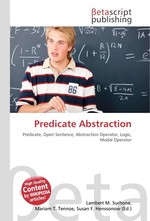Predicate Abstraction
Lambert M. Surhone, Mariam T. Tennoe, Susan F. Henssonow
бумажная книга
High Quality Content by WIKIPEDIA articles! In logic, predicate abstraction is the result of creating a predicate from an open sentence. If Q(x) is any formula with x free then the predicate formed from that sentence is (?x.Q(x)), where ? is an abstraction operator. The resultant predicate (?x.Q(x)) is a monadic predicate capable of taking a term t as argument as in (?x.Q(x))(t), which says that the object denoted by 't' has the property of being such that Q. The law of abstraction states ( ?x.Q(x) )(t) ? Q(t/x) where Q(t/x) is the result of replacing all free occurrences of t in Q by x. This law is shown to fail in general in at least two cases: (i) when t is irreferential and (ii) when Q contains modal operators. In mathematics, an open sentence (usually an equation or inequality) is described as "open" in the sense that its truth value is meaningless until its variables are replaced with specific numbers, at which point the truth value can usually be determined (and hence the sentences are no longer regarded as "open").
Данное издание не является оригинальным. Книга печатается по технологии принт-он-деманд после получения заказа.


